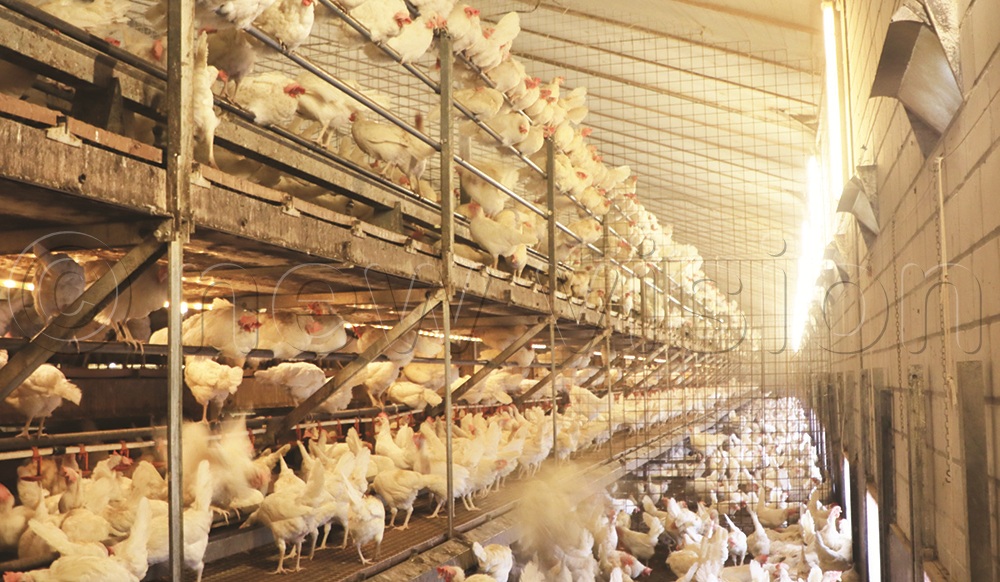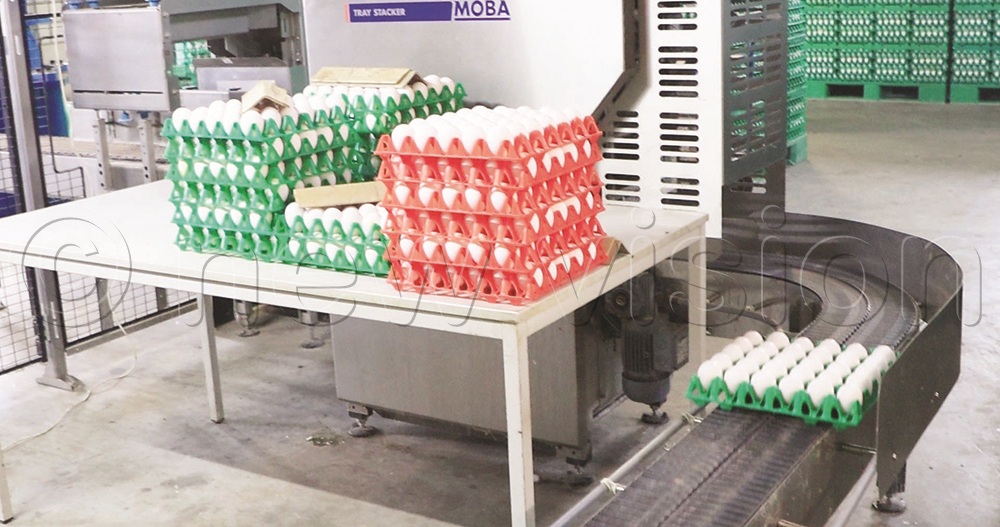Dutch poultry farming influences Uganda’s best farmers
The poultry cohort among Uganda’s 2024 best farmers found themselves immersed in a world of innovation.
Mukama, Okao and Ssekajja with one of the officials at Vencomatic during the tour. (Photos by Joshua Kato)
By Joshua Kato
Journalists @New Vision
________________
Thirteen winners of the 2024 Best Farmers Competition travelled to the Netherlands on October 4-11, 2025. They were grouped into five clusters, that is, dairy, coffee, poultry, beekeeping and entrepreneurship for each to explore innovations in their respective fields.
In the past two weeks, we have covered the dairy and coffee cohorts. In the third of a five-part series, Joshua Kato focuses on the poultry team, who learned the value of quality feeds, strict hygiene, breed selection and automation to boost efficiency and profits.
The poultry cohort among Uganda’s 2024 best farmers found themselves immersed in a world of innovation.
The Dutch poultry sector is characterised by technology and efficiency and as the farmers quickly realised, some of the innovations are not far removed from Uganda.
Uganda imports chicken eggs, day-old chicks, mother stock and poultry equipment from Dutch companies such as Angel Eggs, Vencomatic, Hatchtech and Verbeek.

A broiler farm in the Netherlands.
Dutch livestock feeds, especially from Koudjis Nutrition BV, are also widely used in Uganda. The poultry group comprised Paul Kibwika of Emerge Enterprises, Tom Okao of Eco-Harvest farm and Abbas Sekajja of Abbas Chicken.
At Koudjis Nutrition BV
On October 6, the farmers visited Koudjis/De Heus in the Netherlands.
Koudjis, a sponsor of the Best Farmers Competition, is Uganda’s leading distributor of poultry feeds and ranks among the top 10 livestock feed producers in the Netherlands. During the tour, the farmers saw containers of chicken feed bound for Uganda.
At the laboratory, they were surprised to find packs of silverfish (mukene) from Lake Victoria being tested as a raw material for feed production.
“We need about 200,000 tonnes of quality raw materials for our factory in Njeru,” Johan Verhoek of Koudjis Nutrition BV/De Heus says.
The Njeru plant, launched by President Yoweri Museveni last month, mainly produces fish feeds.
Verhoek emphasises the importance of quality inputs: “If you invest in quality feeds, your animals will give you quality products. Many Ugandan farmers fear investing in good technologies, but those who do enjoy higher profit margins.”
At Angel Eggs
On October 7, the poultry farmers visited Angel Eggs B.V founded in 2014 by Twan and Jeroen Engelen in Someren.
The farmers were told that Angel Eggs are exported to eastern Europe, Asia, Africa, the Middle East and North America.
“I have been importing eggs from this company, although I had never visited it,” Sekajja says.
The group observed automated hatcheries, vaccinations and packing systems that minimise human involvement and maximise efficiency.
Opportunities for Uganda
According to 2024 figures, Uganda imported feeds worth $55.93m from Netherlands, $3.44m worth of live animals and $2.99m worth of eggs and semen.

An automated egg packing system at Angel Eggs in the Netherlands.
While speaking during the matchmaking session on October 9, in the Netherlands, Andrew Byaruhanga, who is in charge of policy officer-trade, investment and economic diplomacy at the Embassy of the Netherlands, said there are many opportunities that Ugandan poultry farmers can get from the Netherlands including;
- Trade in mother eggs and day-old chicks
- Trade in livestock feeds, including Ugandan farmers supplying raw materials
- Trade in poultry supporting systems, for example automated drinkers and feeders
- Sharing knowledge among the farmers Poultry in the Netherlands Verhoek says poultry accounts for about 5% of Dutch agricultural production.
“It is one of the most enterprising sectors, providing jobs and taxes to the country,” he said.
The sector is highly automated, with innovations in breeding, feeding and processing. The Dutch Poultry Centre reported 99 million chickens in the Netherlands in 2023.
With broilers produced in four-week cycles, actual annual output is higher.
The broiler sub-sector dwarfs Uganda’s entire poultry industry by more than two-fold. The Dutch Poultry Centre reports that the Netherlands is the sixth-largest broiler producer in the European Union, with 7% of total EU production—equivalent to 869,000 tonnes in 2021.
As of June 2022, the country had 70 broiler breeder rearing farms with 2.8 million birds, 190 production farms with five million birds and 640 broiler farms with 49 million birds.
Poultry in Uganda Uganda’s chicken population stood at 57.8 million in 2024, according to the National Livestock Census by Uganda Bureau of Standards, up 54.5% from 2008. Indigenous breeds made up 69.9%, while exotic and cross breeds accounted for 30.1%.
The census estimated 6.4 million laying hens, with an average weekly egg production of 4.5. Exotic layers had the highest laying percentage at 65.5%, compared to 33.8% for indigenous breeds.
What farmers say
Prof. Paul Kibwika
You have to appreciate the level of technological advancement exhibited by farmers in the Netherlands. This includes egg selection, breeding to vaccinations among others.
However, we are happy that even then, we have picked out vital lessons and experiences that can be applied home. These include the feeding routine, the hygiene, breed selection.
Abbas Ssekajja
The quality of the eggs, chicks everything is very good. The Dutch put emphasis on the fine details that in the end improve the production process.
The level of automation means that there is very little human involvement in the processes creating a level of efficiency that all of us must aim at.
Tom Okao
These people take every step of the various processes seriously. They have been able to sustain their agriculture sector because of continuous innovations. These are aspects that our agriculture sector must pick up.
Factfile
The 2024 winners that travelled to the Netherlands included Prof. Paul Kibwika (overall winner), Brenda Tusiime (1st runner-up, Kabarole), Meridah Nandudu (2nd runner-up, Bulambuli), and Abbas Sekajja (Wakiso/Luwero). Others were Tom Okao (Lira), Janny Oyella (Gulu), Joyce Omiat (Bukedea), Emmanuella Oroma (Nebbi), Allen Atuhaire (Sheema), Joseph Nkandu (NUCAFE), Godfrey Bwaya (Elgon Coffee Growers), Apollo Gabazira (Iganga), and Martha Matovu Namabiro (DAFAN).
They were joined by two self-paying agripreneurs, James Kanyije and Pius Kwesiga of Nile Fresh. The Best Farmers Competition is organised by Vision Group in partnership with the Embassy of Netherlands, KLM Royal Dutch Airlines, dfcu Bank and Koudjis Nutrition BV.
Each year, the winners share sh150m in prize money and get an all-expenses-paid learning tour to the Netherlands.
Since the competition began in 2014, there have been 121 winners, with 111 having travelled to the Netherlands.
